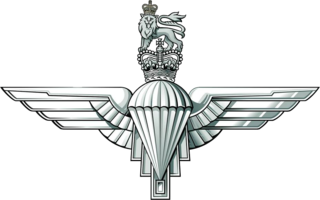
The Parachute Regiment, colloquially known as the Paras, is an airborne infantry regiment of the British Army. The first battalion is part of the Special Forces Support Group under the operational command of the Director Special Forces. The other battalions are the parachute infantry component of the British Army's rapid response formation, 16 Air Assault Brigade. The regiment, along with the Guards, are the only line infantry regiments of the British Army that have not been amalgamated with another unit since the end of the Second World War.

The Welsh Guards, part of the Guards Division, is one of the Foot Guards regiments of the British Army. It was founded in 1915 as a single-battalion regiment, during the First World War, by Royal Warrant of George V. Shortly after the regiment's formation, it was deployed to France where it took part in the fighting on the Western Front until the end of the war in November 1918. During the inter-war years, the regiment undertook garrison duties in the United Kingdom, except between 1929 and 1930 when it deployed to Egypt, and late 1939 when it deployed to Gibraltar.

The Battle of Goose Green was fought from 28 to 29 May 1982 by British and Argentine forces during the Falklands War. Located on East Falkland's central isthmus, the settlement of Goose Green was the site of an airfield. Argentine forces were located in a well-defended position within striking distance of San Carlos Water where the British task force had positioned themselves after their amphibious landing.
The Battle of Wireless Ridge was an engagement of the Falklands War which took place on the night from 13 to 14 June 1982, between British and Argentine forces during the advance towards the Argentine-occupied capital of the Falkland Islands, Port Stanley.
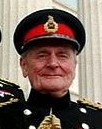
Field Marshal Sir Roland Christopher Gibbs, was Chief of the General Staff, the professional head of the British Army, from 1976 to 1979, and Lord Lieutenant of Wiltshire from 1989 to 1996. He saw active service in the Second World War and acted as chief of staff to the commander of the operation to evacuate all British troops and civilians from Aden during the Aden Emergency.
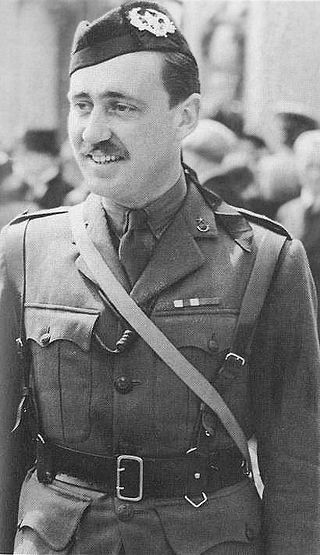
Major-General John Dutton Frost, was an airborne officer of the British Army best known for being the leader of the small group of British airborne troops that actually arrived at Arnhem bridge during the Battle of Arnhem in Operation Market Garden, in World War II. He was one of the first to join the newly formed Parachute Regiment and served with distinction in many wartime airborne operations, such as in North Africa and Sicily and Italy, until his injury and subsequent capture at Arnhem. He retired from the army in 1968 to become a beef cattle farmer in West Sussex.
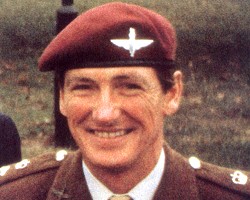
Lieutenant Colonel Herbert Jones,, known as H. Jones, was a British Army officer and posthumous recipient of the Victoria Cross (VC). He was awarded the VC after being killed in action during the Battle of Goose Green for his actions as commanding officer of the 2nd Battalion, Parachute Regiment, during the Falklands War.

Brigadier Lewis Pugh Evans, was a British Army officer and a recipient of the Victoria Cross, the highest award for gallantry in the face of the enemy that can be awarded to British and Commonwealth forces.
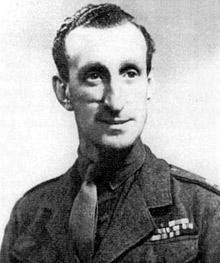
Colonel Richard Geoffrey Pine-Coffin, was an officer of the British Army who saw service during the Second World War. He commanded the 3rd Parachute Battalion in North Africa and the 7th Parachute Battalion in Normandy, Belgium and Germany. His troops, amused by the unusual applicability of his family name, referred to him as "Wooden Box".
Major General Charles Dair Farrar-Hockley, MC is a retired British Army officer, and a former Director General of the Chartered Institute of Arbitrators. He is the son of General Sir Anthony Farrar-Hockley.

Brigadier Alastair "Jock" Stevenson Pearson, was a baker, farmer and one of the most highly regarded soldiers of the Parachute Regiment and the British Army who served in the Second World War.

The Reverend David Cooper was the Army Chaplain attached to the 2nd Battalion, The Parachute Regiment during the Falklands War of 1982. He was filmed for television news on 30 May 1982 officiating at the moving field burial service for the 18 Paras who were killed in the Battle of Goose Green, including Lt. Col.'H' Jones. During that service he used the expression "Think on", which became something of a catchphrase for him with the media. Cooper was also an army champion shot at Bisley. He ministered to the 2nd Battalion, The Parachute Regiment during the Falklands War and during its tours in Northern Ireland.

Major General Michael John Hatley Walsh, was a British Army officer. He was the Scout Association's Chief Scout from 1982 to 1988.

The Second Battalion, Parachute Regiment, is a formation of the Parachute Regiment, part of the British Army, and subordinate unit within 16th Air Assault Brigade.

Lieutenant General Sir Hew William Royston Pike is a retired senior British Army officer known for his service in the Falklands War and for his command in Northern Ireland.

General Sir Kenneth Thomas Darling was a senior British Army officer who after serving with distinction during the Second World War was Commander-in-Chief (C-in-C) of Allied Forces Northern Europe 1967–69.

Colonel John Llewellyn Waddy OBE was a British Army officer who served during the Second World War, Palestine and the Malayan Emergency before becoming Colonel of the SAS.
General Sir Thomas Cecil Hook Pearson, was a senior officer of the British Army who served as Commander-in-Chief of Allied Forces Northern Europe from 1972 to 1974. At the time of his death, he was the oldest living British full general.

Lieutenant General Sir John Gordon Lorimer, is a retired senior British Army officer, who served as the Chief of Joint Operations and the Defence Senior Adviser to the Middle East and North Africa. He was appointed Lieutenant Governor of the Isle of Man on 29 September 2021.

Major-General Jonathan David Shaw is a former British Army officer.
















